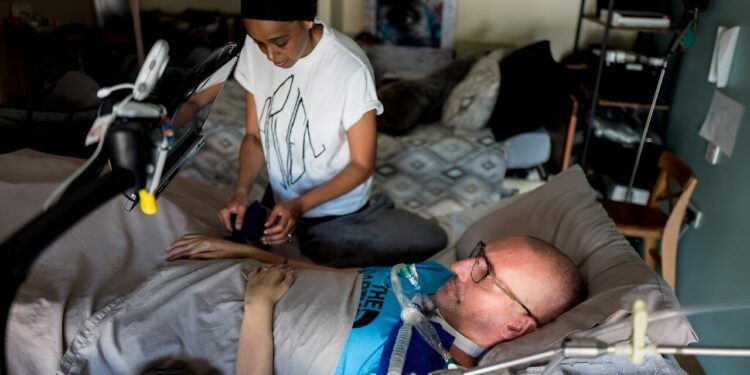French musician Guilhem Gallart, member of the Fonky Family, is here with his partner Wahiba; he was diagnosed with ALS in 2015.
A new treatment shows promise for ALS, a deadly neurodegenerative disease, a study based on mice showed Tuesday.
Amyotrophic lateral sclerosis, sometimes called Lou Gehrig’s disease after the famous baseball player, devastates nerve cells in the brain and spinal cord.
It affects approximately 30,000 Americans at any one time, causing a progressive loss of motor and cognitive functions. Most patients die within five years of their diagnosis.
In the new research, published in the journal Biology PLOSA team led by Jeffrey Agar of Northeastern University studied a way to target and stabilize an abundant enzyme that protects cells from the toxic byproducts of eating food and breathing oxygen.
Inherited mutations in the gene responsible for producing this protein, called SOD1, are involved in many cases of ALS, and in other cases, such mutations may occur without a family history.
A defective SOD1 gene causes the protein to be assembled in an incorrect shape. This prevents it from performing its tasks, but can also trigger a buildup of protein clumps that are also characteristic of Alzheimer’s, Parkinson’s, and other diseases.
Agar told AFP that over 12 years he and his colleagues had discovered and tested a “molecular stabilizer”, S-XL6, which acts like a “spot” and forces the protein to stay in the correct configuration.
A major challenge was finding a molecular spot that would target only SOD1, and not “off-target” proteins, which would poison the host.
The team tested their molecule on mice genetically engineered to suffer from a form of ALS and found that it not only restored the protein’s function, but also stopped its toxic side effects. Safety has also been proven in rats and dogs.
It was able to stabilize 90 percent of SOD1 proteins in blood cells and 60 to 70 percent in brain cells.
They hope to soon obtain approval to move the molecule into human clinical trials, and an investor has purchased the rights to a patent.
Ultimately, if it proves true, Agar said he hopes it could become a co-treatment for Biogen’s Qalsody, a breakthrough regimen that received accelerated approval by the Food and Drug Administration in 2023, which works by reducing the number of copies of the SOD1 gene in the body. product.
More information:
Md Amin Hossain et al, Evaluation of protein cross-linking as a therapeutic strategy to stabilize SOD1 variants in a murine model of familial ALS, Biology PLOS (2024). DOI: 10.1371/journal.pbio.3002462
© 2024 AFP
Quote: New treatment shows promise against fatal neurological diseases: study (January 31, 2024) retrieved January 31, 2024 from
This document is subject to copyright. Apart from fair use for private study or research purposes, no part may be reproduced without written permission. The content is provided for information only.



